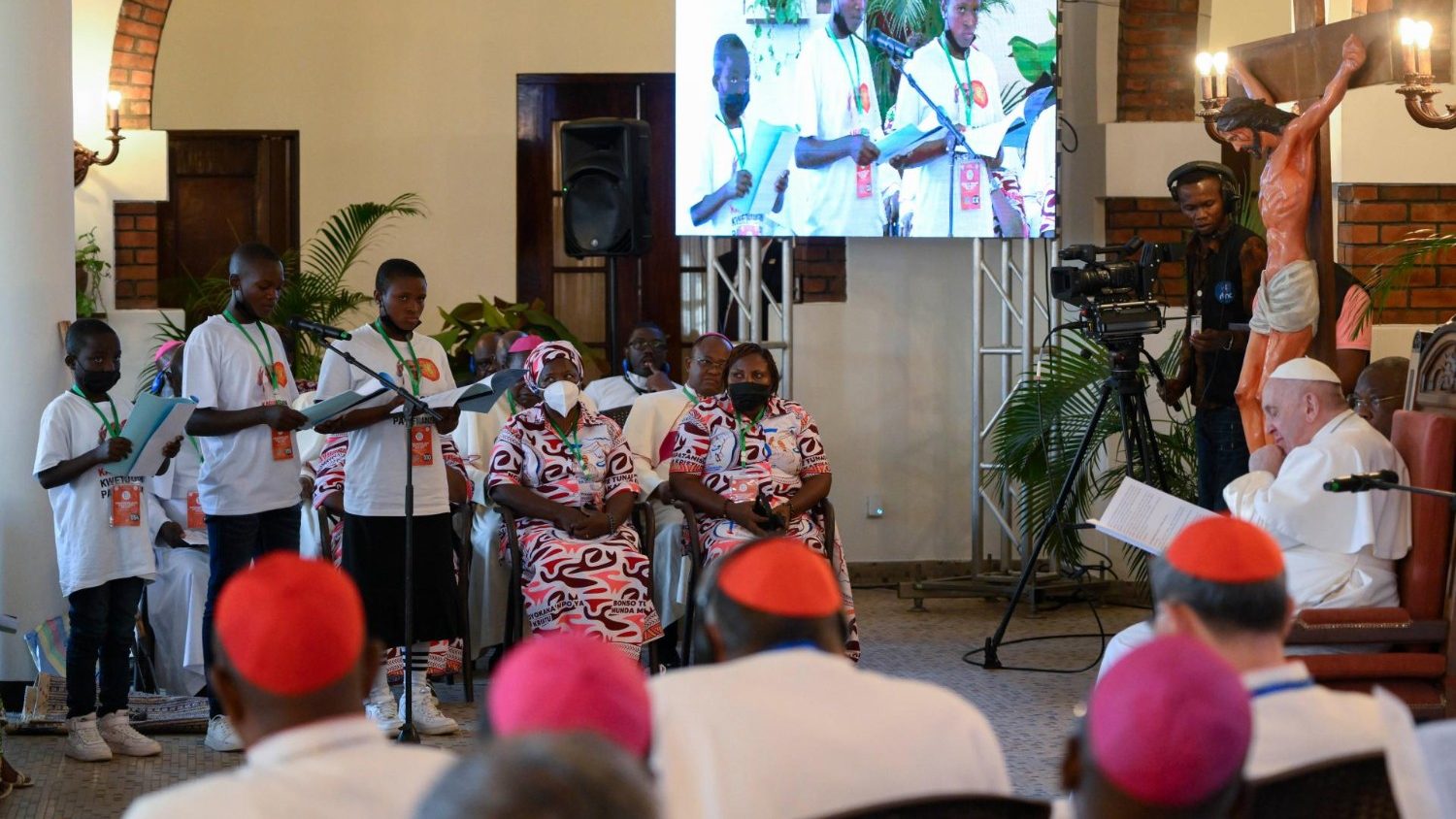The Pope’s meeting with survivors, victims of the violence in the eastern part of the Democratic Republic of the Congo | VATICAN MEDIA Divisione Foto
Survivors of the ongoing conflict in the eastern part of the Democratic Republic of Congo shared stories of brutal violence, including mass killings and mutilation, abduction and lost relatives, serial rape and sexual slavery, and displaced people living in overcrowded and unsanitary refugee camps.
But amid the horrors of war and natural disasters, those who took part in Wednesday’s afternoon meeting with Pope Francis also spoke of forgiveness and hope, with one survivor expressing the hope of all: “We want to leave behind this dark past and be able to build a beautiful future.”
‘I am close to you’
In his own remarks, the Holy Father said, “We continue to be shocked to hear of the inhumane violence that you have seen with your eyes and personally experienced.”
“We are left without words. We can only weep in silence.”
Pope Francis had originally intended to visit the eastern part of the country, but ongoing security issues made such a trip impossible. Instead, the Pope told the people of the region, “I am close to you: your tears are my tears; your pain is my pain,” adding, “To every family that grieves or is displaced by the burning of villages and other war crimes, to the survivors of sexual violence and to every injured child and adult, I say: I am with you; I want to bring you God’s caress.”
He went on to condemn, “in the name of God … the armed violence, the massacres, the rapes, the destruction and occupation of villages, the looting of fields and cattle … as well as the murderous, illegal exploitation of the wealth of this country, and the attempts to fragment the country in order to control.”
Pope Francis with one of the witnesses during the encounter with survivors
Listen to the cry of their blood!
The Pope made a heartfelt appeal to all people, and especially those that are fomenting war in the Democratic Republic of Congo: “Listen to the cry of their blood, open your ears to the voice of God … and to the voice of your conscience: put away your weapons, put an end to war!”
“Enough! Stop getting rich at the cost of the poor, stop getting rich from resources and money stained with blood!”
He then asked what we can do and where we can begin in order to promote peace. He proposed, in response, “starting again with two ways of saying ‘no’ and two ways of saying ‘yes’.”
No to violence and resignation
First, he said, we must say “no to violence, always and everywhere,” without exception. At the same time, he insisted that saying “no” to violence means more than avoiding acts of violence; it involves eliminating the roots of violence, including “greed, envy, and, above all, resentment.” Addressing the survivors present at the meeting, Pope Francis said, “I would like to ask everyone to behave as you, our courageous witnesses have suggested to us: Have the courage to disarm the heart.”
Pope Francis went on to call everyone to say “no” to resignation. “I once more invite all those living in the Democratic Congo not to give up but to commit themselves to building a better future,” he said.
“Even in the East, peace is possible! Let us believe this! And let us work for it, without delegating it to others.”
Yes to reconciliation and hope
The Holy Father then spoke about the two ways of saying “yes,” beginning with saying “yes” to reconciliation. Once more addressing the survivors, praised their desire to commit themselves “to forgiving one another and to rejecting war as a means of resolving differences.”
The prophetic voice of Christianity, he said, “means responding to evil with good, to hatred with love, to division with reconciliation.” All these things, he continued, “are more powerful than evil … because they transform reality from within, instead of destroying it from without.”
“Only in this way can we defeat evil, as Jesus did on the tree of the Cross, by taking it upon Himself and transforming it by His love.”
Finally, the Pope highlighted the “decisive ‘yes’, the yes to hope.” Hope, he said, has a source, like a wellspring: Jesus. “With Jesus, evil no longer has the last word over life,” he said, pointing again to Jesus triumphing over death and the grave.
“Brothers and sisters of the east of the country, this hope is meant for you, and you have a right to it,” he said. Yet, he continued, it is also a right that must be earned “by patiently sowing peace day after day.” To sow peace is good for us, he explained, adding “it sets us free from narrow concern for personal gain and gives us a reason for living each day; it seasons our lives with liberality and makes us more and more like God, the patient sower who sows seeds of hope.”
Source: Vatican News

